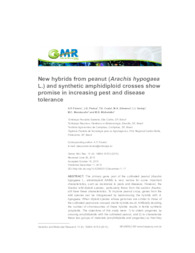New hybrids from peanut (Arachis hypogaea L.) and synthetic amphidiploid crosses show promise in increasing pest and disease tolerance.
New hybrids from peanut (Arachis hypogaea L.) and synthetic amphidiploid crosses show promise in increasing pest and disease tolerance.
Author(s): FAVERO, A. P.; PADUA, J. G.; COSTA, T. da S. A.; GIMENES, M. A.; GODOY, I. J.; MORETZSOHN, M. de C.; MICHELOTTO, M. D.
Summary: The primary gene pool of the cultivated peanut (Arachis hypogaea L., allotetraploid AABB) is very narrow for some important characteristics, such as resistance to pests and diseases. However, the Arachis wild diploid species, particularly those from the section Arachis, still have these characteristics. To improve peanut crops, genes from the wild species can be introgressed by backcrossing the hybrids with A. hypogaea. When diploid species whose genomes are similar to those of the cultivated peanut are crossed, sterile hybrids result. Artificially doubling the number of chromosomes of these hybrids results in fertile synthetic polyploids. The objectives of this study were: 1) to obtain progenies by crossing amphidiploids with the cultivated peanut, and 2) to characterize these two groups of materials (amphidiploids and progenies) so that they may be efficiently conserved and used. Using morphological, molecular, and pollen viability descriptors we evaluated one cultivar of A. hypogaea (IAC 503), eight synthetic amphidiploids, and the progenies resulting from four distinct combinations of crossing between IAC 503 and four amphidiploids.
Publication year: 2015
Types of publication: Journal article
Observation
Some of Embrapa's publications are published as ePub files. To read them, use or download one of the following free software options to your computer or mobile device. Android: Google Play Books; IOS: iBooks; Windows and Linux: Calibre.
Access other publications
Access the Agricultural Research Database (BDPA) to consult Embrapa's full library collection and records.
Visit Embrapa Bookstore to purchase books and other publications sold by Embrapa.

